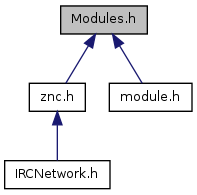#include <znc/zncconfig.h>#include <znc/WebModules.h>#include <znc/Utils.h>#include <znc/Threads.h>#include <znc/Message.h>#include <znc/main.h>#include <znc/Translation.h>#include <functional>#include <memory>#include <set>#include <queue>#include <sys/time.h> Include dependency graph for Modules.h:
Include dependency graph for Modules.h: This graph shows which files directly or indirectly include this file:
This graph shows which files directly or indirectly include this file:Go to the source code of this file.
Classes | |
| struct | CModuleEntry |
| C-style entry point to the module. More... | |
| class | CCapability |
| class | CTimer |
| class | CFPTimer |
| class | CModuleJob |
| A CJob version which can be safely used in modules. More... | |
| class | CModInfo |
| class | CModCommand |
| A helper class for handling commands in modules. More... | |
| class | CModule |
| The base class for your own ZNC modules. More... | |
| class | CModules |
Macros | |
| #define | ZNC_EXPORT_LIB_EXPORT |
| #define | MODCOMMONDEFS(CLASS, DESCRIPTION, TYPE) |
| #define | MODCONSTRUCTOR(CLASS) |
| Instead of writing a constructor, you should call this macro. | |
| #define | USERMODULEDEFS(CLASS, DESCRIPTION) MODCOMMONDEFS(CLASS, DESCRIPTION, CModInfo::UserModule) |
| This works exactly like MODULEDEFS, but for user modules. | |
| #define | GLOBALMODULEDEFS(CLASS, DESCRIPTION) MODCOMMONDEFS(CLASS, DESCRIPTION, CModInfo::GlobalModule) |
| This works exactly like MODULEDEFS, but for global modules. | |
| #define | NETWORKMODULEDEFS(CLASS, DESCRIPTION) MODCOMMONDEFS(CLASS, DESCRIPTION, CModInfo::NetworkModule) |
| This works exactly like MODULEDEFS, but for network modules. | |
| #define | MODULEDEFS(CLASS, DESCRIPTION) NETWORKMODULEDEFS(CLASS, DESCRIPTION) |
| At the end of your source file, you must call this macro in global context. | |
Typedefs | |
| typedef void(* | FPTimer_t) (CModule *, CFPTimer *) |
| typedef void * | ModHandle |
Functions | |
| template<class M > | |
| void | TModInfo (CModInfo &Info) |
| template<class M > | |
| CModule * | TModLoad (ModHandle p, CUser *pUser, CIRCNetwork *pNetwork, const CString &sModName, const CString &sModPath, CModInfo::EModuleType eType) |
Macro Definition Documentation
◆ GLOBALMODULEDEFS
| #define GLOBALMODULEDEFS | ( | CLASS, | |
| DESCRIPTION | |||
| ) | MODCOMMONDEFS(CLASS, DESCRIPTION, CModInfo::GlobalModule) |
This works exactly like MODULEDEFS, but for global modules.
◆ MODCOMMONDEFS
| #define MODCOMMONDEFS | ( | CLASS, | |
| DESCRIPTION, | |||
| TYPE | |||
| ) |
Value:
}; \
t_s(CString()); /* Don't warn about unused t_s */ \
Info.SetDescription(DESCRIPTION); \
Info.SetDefaultType(TYPE); \
Info.AddType(TYPE); \
Info.SetLoader(TModLoad<CLASS>); \
TModInfo<CLASS>(Info); \
} \
extern "C" { \
/* A global variable leads to ODR violation when several modules are \
* loaded. But a static variable inside a function works. */ \
FillModInfo}; \
return &ThisModule; \
} \
}
Definition Modules.h:258
CString t_s(const CString &sEnglish, const CString &sContext="") const
◆ MODCONSTRUCTOR
| #define MODCONSTRUCTOR | ( | CLASS | ) |
Value:
CModInfo::EModuleType eType) \
: CModule(pDLL, pUser, pNetwork, sModName, sModPath, eType)
Definition IRCNetwork.h:40
Definition User.h:38
Instead of writing a constructor, you should call this macro.
It accepts all the necessary arguments and passes them on to CModule's constructor. You should assume that there are no arguments to the constructor.
Usage:
MODCONSTRUCTOR(MyModule) {
// Your own constructor's code here
}
}
#define MODCONSTRUCTOR(CLASS)
Instead of writing a constructor, you should call this macro.
Definition Modules.h:127
- Parameters
-
CLASS The name of your module's class.
◆ MODULEDEFS
| #define MODULEDEFS | ( | CLASS, | |
| DESCRIPTION | |||
| ) | NETWORKMODULEDEFS(CLASS, DESCRIPTION) |
At the end of your source file, you must call this macro in global context.
It defines some static functions which ZNC needs to load this module. By default the module will be a network module.
- Parameters
-
CLASS The name of your module's class. DESCRIPTION A short description of your module.
◆ NETWORKMODULEDEFS
| #define NETWORKMODULEDEFS | ( | CLASS, | |
| DESCRIPTION | |||
| ) | MODCOMMONDEFS(CLASS, DESCRIPTION, CModInfo::NetworkModule) |
This works exactly like MODULEDEFS, but for network modules.
◆ USERMODULEDEFS
| #define USERMODULEDEFS | ( | CLASS, | |
| DESCRIPTION | |||
| ) | MODCOMMONDEFS(CLASS, DESCRIPTION, CModInfo::UserModule) |
This works exactly like MODULEDEFS, but for user modules.
◆ ZNC_EXPORT_LIB_EXPORT
| #define ZNC_EXPORT_LIB_EXPORT |
Typedef Documentation
◆ FPTimer_t
◆ ModHandle
| typedef void* ModHandle |
Function Documentation
◆ TModInfo()
template<class M >
| void TModInfo | ( | CModInfo & | Info | ) |
◆ TModLoad()
template<class M >
| CModule * TModLoad | ( | ModHandle | p, |
| CUser * | pUser, | ||
| CIRCNetwork * | pNetwork, | ||
| const CString & | sModName, | ||
| const CString & | sModPath, | ||
| CModInfo::EModuleType | eType | ||
| ) |

